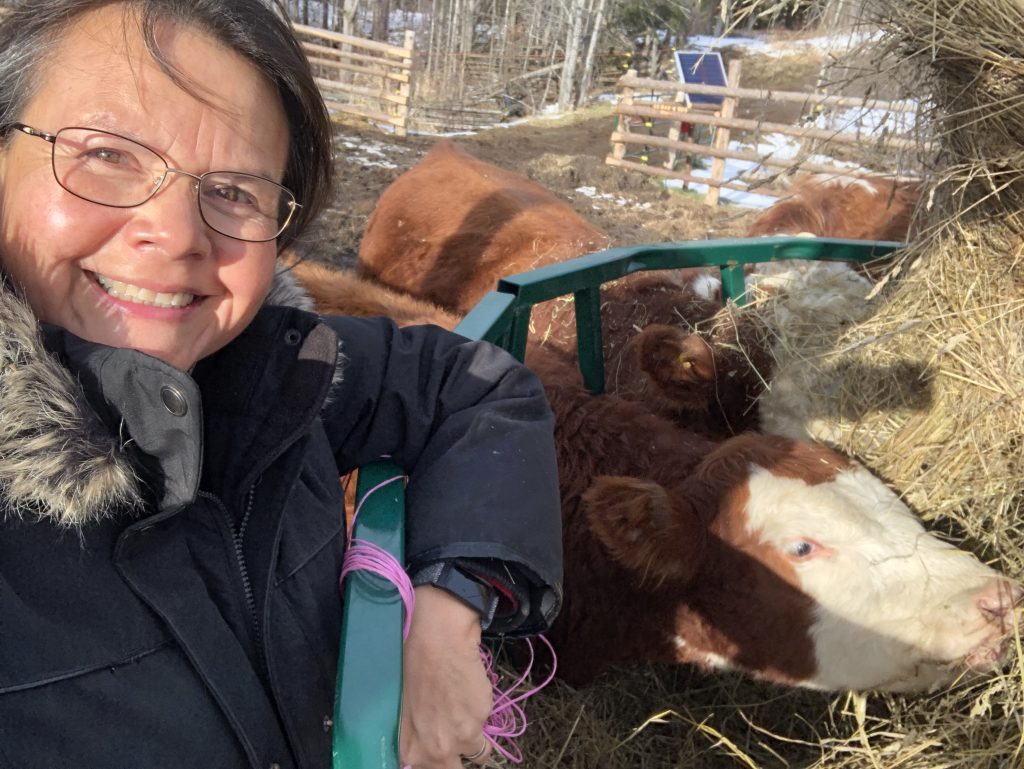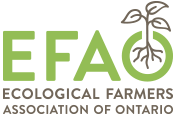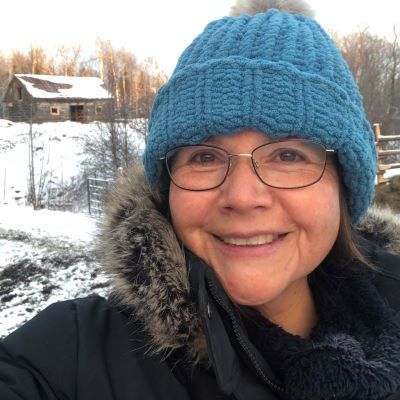Ahnee! Annette Peltier-Flamand n’dizhnikaaz. I am from Wiikwemkoong Unceded Territory in northern Ontario. I grew up on a farm where my family was fairly self-sufficient. We had three large gardens and livestock (cattle, pigs and chickens) which we kept for both sale and sustenance.
I remember my grandfather heading out to the chicken coop with an ax whenever my grandmother decided to cook chicken for supper. As children, we also observed the slaughtering of pigs and would wait with anticipation for the head cheese and blood sausage to be served. These delicacies were a special treat, until we found out why it was called “head cheese” and “blood sausage”. After the death of my grandmother, the farm was eventually let go, but I always remembered the honesty of the farming lifestyle and decided that eventually I would return to that simple way of living.
Way back around 2003, there was a major power outage during the summer. On Manitoulin, the power was out for three days but in other places it was out for weeks. The outage made me think about how dependent I was on others to meet my basic needs. As a single parent I began to wonder what would have happened to my children if the outage had happened in the middle of the winter and decided to take steps to become more self-reliant. I installed an outhouse at the edge of the yard (I live in a very rural area, don’t try this in the city), wood stove in the basement and started returning to my farming roots by getting chickens, taking up gardening, beekeeping and learning how to make my own wine, soap, preserves, and skin care products.
In the summer of 2019, the feeling that I should pursue an education in horticulture was overwhelming. I signed up for the online Horticulture classes at the University of Guelph and took the plunge, closing my home-based business of 15 years at the end of August and starting classes in September. The intention was to further my knowledge and understanding of plants to start a strawberry “pick your own” operation and market garden. I received my Horticulture Certificate in the spring of 2020 and was immediately offered a contract to coordinate the Gardening Program for my community. The gardening program activities included supplying information on vegetable production, site preparation such as plowing and tilling, distributing live plants and seeds, and sourcing water totes and barrels. We eventually bought a water pump, put a tote on a trailer and delivered water for gardeners for the rest of the summer. We also had a series of workshops on boiling water baths and pressure canning.
In 2021 we received financial assistance from the Local Food Infrastructure Fund to purchase our own tractor, one ton truck, dump trailer, water trailer, greenhouses, water tanks, irrigation equipment, etc. which made our jobs last summer much easier.
 I am still working towards my Horticulture Diploma (only 2 more courses) and work for Wiikwemkoong as the Agricultural Resources Management Coordinator. In addition to the gardening program activities, I also coordinate the logistics of the backyard poultry program, assist the high school students to propagate tomatoes and peppers for distribution through the gardening program, facilitate food preservation workshops, oversee the band garden/food bank garden, provide training, manage the beef cattle herd, oversee two greenhouses, promote safety in agriculture, and feed cows on weekends. I am also a 4-H Leader, member of the Master Gardeners (Algoma group) and board member for the Indian Agriculture Program of Ontario.
I am still working towards my Horticulture Diploma (only 2 more courses) and work for Wiikwemkoong as the Agricultural Resources Management Coordinator. In addition to the gardening program activities, I also coordinate the logistics of the backyard poultry program, assist the high school students to propagate tomatoes and peppers for distribution through the gardening program, facilitate food preservation workshops, oversee the band garden/food bank garden, provide training, manage the beef cattle herd, oversee two greenhouses, promote safety in agriculture, and feed cows on weekends. I am also a 4-H Leader, member of the Master Gardeners (Algoma group) and board member for the Indian Agriculture Program of Ontario.
Through my hobbies, education and farming experiences, I feel a sense of control over my life and future, knowing that I am more capable of surviving on my own and would like to empower others to feel the same way. My drive to educate and enable others is intensified by the uncertainty of the pandemic.
Through my recent education at the University of Guelph and participation in EFAO workshops, I learned about the impact of conventional agricultural practices on the earth and environment, and decided to do more to educate others to consider conducting their activities with minimal carbon output. EFAO’s mandate of promoting farming in an ecologically conscious way also falls in line with my inherent responsibility to respect the earth and environment for the sake of our health and future generations. In First Nation communities, the cultivation of food is complementary to traditional harvesting activities such as hunting, fishing and foraging. Agriculture is a part of the solution to localize the food supply to keep the people healthy.
Throughout my short career, I have come to realize that there are many obstacles that face Indigenous people who wish to adopt the agricultural lifestyle, including;
- a lack of appropriate education opportunities in our home community (on the job training vs. leaving home community to attend post secondary institutions),
- lack of money and grants to invest in starting up a farm (no collateral on reserve, no jobs to save money to pay back loans),
- lack of good land (in many First Nation communities, the good land was kept for the settlers and the Indigenous were sent to reserves that were established on rocky, inhospitable land with little topsoil),
- low self esteem/confidence/social issues due to the digression of family structure resulting from separating children from their families at young ages and the abuse suffered at residential schools,
- Certain government regulations that support corporations and ignore the needs of subsistence farming, and small scale farm businesses.
The Wiikwemkoong Agricultural Resources Management Program has already had a noticeable impact on the community. In 2019 there were approximately 30 participants in the gardening program. In 2020 there were 274. Last year there were 403 individuals who accessed our services. More and more people are vegetable gardening, with some people planting bigger gardens and more new gardeners accessing the program’s services. New in 2021 was the introduction of the Backyard Chicken Program where people were able to have their first experiences with keeping livestock. We have also observed more people offering produce and fresh eggs for sale in the community, which contributes to our economy and the accessibility to locally produced, fresh food.
Recently, with funding from the NDN Collective of South Dakota, we purchased a starter herd of Hereford beef cattle from Rainy River (northwestern Ontario). Eight bred cattle and seven heifers arrived on the evening of November 23, 2021. The cattle herd will be maintained to supply the food bank with meat. Some meat will be offered for sale. The daily care of the cattle will also provide hands-on training opportunities. We are anticipating a few “city slicker” moments as our trainees learn the meaning of “hands on training” when the first cow gives birth in March. We also appreciate the support we have received from community members who have stepped up to offer assistance including use of their land to harvest forage, lending expensive equipment, and offering discounts on services and equipment.
Our program now employs five individuals and “grows” substantially during the summer months with the addition of summer students who assist with the gardens.
The dream for revitalizing agriculture in Wiikwemkoong includes securing land so that we can begin developing permanent facility to accommodate the various stages of production including barns, coops, gardens, pastures, greenhouses, waste management/composting area, commercial kitchen, classroom space, farmers market, retail store, abbatoir, butcher shop, and offices. This will enable us to provide on-the-job training and workshops in a more structured environment to more people who can then pursue careers in agriculture or take home what they have learned to become more self-sufficient. Structured as a social enterprise, the entire operation will provide meat and vegetables for the food bank as well as for sale locally. All of our activities will encourage ecological farming practices and field trials so that people can see for themselves that there can once again be balance between people and their environment.
Chi Miigwech (a big thank you) to the EFAO for this opportunity to share and to all the members/participants of the EFAO for having the welfare of our fellow creatures and environment in mind when planning your agricultural activities.

